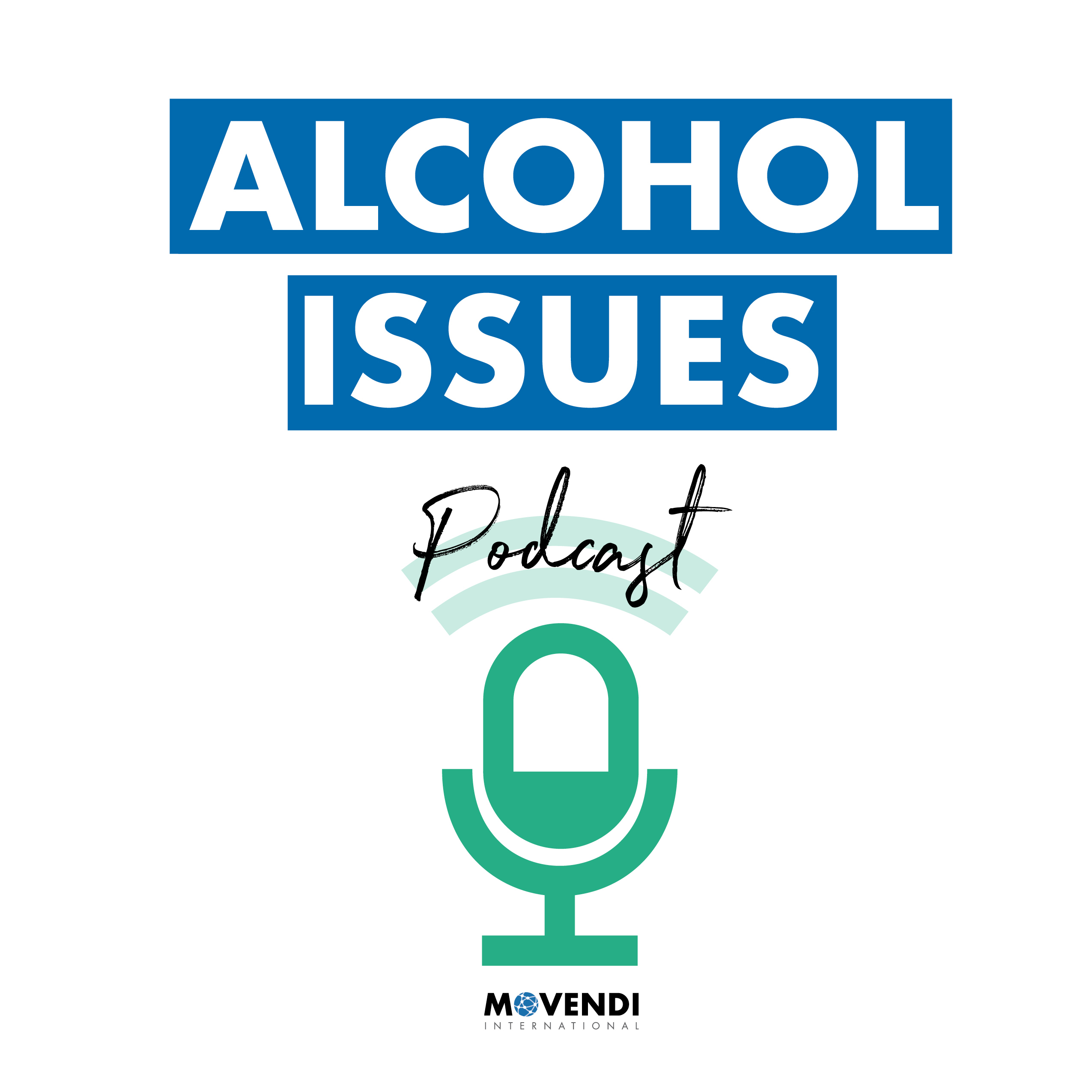Episodes
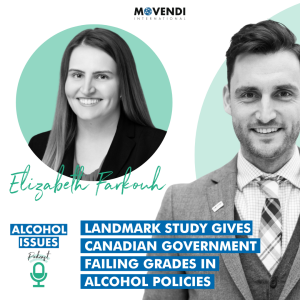
Wednesday Apr 23, 2025
Landmark Study Gives Canadian Government Failing Grades In Alcohol Policies
Wednesday Apr 23, 2025
Wednesday Apr 23, 2025
Landmark Study Gives Canadian Government Failing Grades In Alcohol Policies
The topic of today’s episode is the CAPE – the Canadian Alcohol Policy Evaluation.
The CAPE is a world class scientific approach to assessing how Canada’s national and provincial governments are doing in alcohol policy making. The robust, regular, comprehensive evaluation combined with the infrastructure around it and public relations work linked to it make for an inspiring model for countries around the world.
To discuss all this in depth, Elizabeth Farkouh joins today’s show. She is the lead author of the study published in May 2024 about their assessment of federal alcohol policies in Canada and priority recommendations.
Elizabeth and host Maik Dünnbier had a great conversation with many insights from her different experiences and with many lessons for alcohol policy not just for Canada but worldwide.
Highlights of the show
In today’s show, Maik speaks with Elizabeth about the heavy alcohol burden in Canada and the country’s policy response. She shares mind blowing – in the concerning kind of way – facts about the magnitude of alcohol harm. In the face of this massive alcohol burden, the CAPE’s results and grades for the Canadian government are truly shocking.
Elizabeth explains the grades and in the conversation, Maik and Elizabeth dive into the details of key policy recommendations, focusing on the alcohol policy best buys.
They also talk about comparability of the CAPE to other countries and the potential of applying this type of alcohol policy evaluation in other countries.
And they explore how the scientific exercise of assessing policy implementation – or complete lack thereof – can be linked to advocacy and community action for change. Elizabeth shares an inspiring best practice from Canada’s experience.
Our guest
Elizabeth Farkouh is a research assistant at the Canadian Institute for Substance Use Research.
She has conducted international work related to alcohol use including a review on the effect of alcohol policies on suicide, an educational curriculum on alcohol and cancer for middle school students, and the Canadian Alcohol Policy Evaluation project.
Follow Elizabeth's work on LinkedIn.
Resources for the episode
- Science Digest: "Canadian Government Receives Failing Grade for Lack of Evidence-Based Alcohol Policies"
- The Canadian Alcohol Policy Evaluation (CAPE)
- New Study: Alcohol Policies to Prevent NCDs Generate Positive Societal Impacts Immediately
- WHO Report: Alcohol Best Buys With Second Highest Return on Investment
Feedback
Your feedback, questions, and suggestions for future topics and guests is most welcome. Please get in touch at: maik.duennbier@movendi.ngo.
You are most welcome to follow Movendi International and Maik Dünnbier on LinkedIn, too.
About The Alcohol Issues Podcast
The Alcohol Issues Podcast is an original production from Movendi International. It’s a show about latest alcohol policy developments, brand new research, and stories that reveal the predatory practices of the alcohol industry. We bring you in-depth conversations with trail-blazing alcohol policy makers, visionary community activists, and leading scientists. We do it all to reshape how the world thinks about alcohol’s impact on society and the benefits of alcohol policy action.
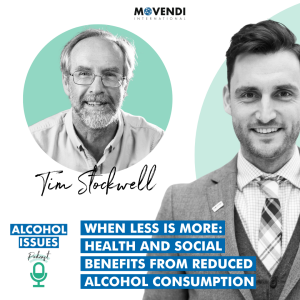
Thursday Mar 13, 2025
When Less Is More: Health And Social Benefits From Reduced Alcohol Consumption
Thursday Mar 13, 2025
Thursday Mar 13, 2025
When Less Is More: Health And Social Benefits From Reduced Alcohol Consumption
In today’s show we’re discussing a brand new report that compiles world class evidence about what happens when alcohol consumption goes down.
Together with Dr Tim Stockwell, we bring you an in-depth view of the science behind the benefits of declining alcohol consumption – on the individual and societal levels.
The report called “When less is more. The health and social benefits from reduced alcohol consumption” is part of the awesome report series “Alcohol and Society”. You can find all other reports on the website and I’ll put more information in the show notes.
We recorded this conversation on March 6, 2025.
Highlights of the show
In today’s show, Tim and host Maik Dünnbier discuss why the researchers group of the Alcohol an Society report series decided to flip the perspective from looking into the harms caused by alcohol to examining the benefits of reduced alcohol consumption.
The new report covers individual and societal dimensions of the benefits of reduced alcohol consumption. Maik and Tim talk about both the individual level and the societal picture to understand what happens when people and populations reduce alcohol consumption.
Tim shares which findings he thinks people should absolutely know about regarding the personal benefits from reduced alcohol use.
As the report shows, discussing the evidence of the positive consequences for people and societies when alcohol consumption falls is not common. Therefore, flipping the perspective from focusing on harms to focusing on what the science says about the good things that happen when alcohol consumption declines is fascinating.
Tim also shares research insights on what governments can do to achieve these benefits.
Our guest
Our guest for today’s conversation is Dr Tim Stockwell. He’s been on the show before.
Tim held the position of director of the Canadian Institute for Substance Use Research, at the University of Victoria since its inception in 2004 until 2020. He has also been a professor in the Department of Psychology at the University of Victoria since 2004. He has published over 400 research papers, book chapters and monographs, plus several books on prevention and treatment issues.
The research reports in the Alcohol and Society series are produced by an international group of medical and public health researchers from Canada, Australia, the United States, and Sweden. This group convenes each year without compensation to produce a report about a unique topic concerning alcohol. With the latest report, the series comprises now 11 landmark scientific investigations. The reports have the goal to evaluate the most relevant published scientific research from around the world and to provide a summary of the best knowledge on a highly relevant topics, such as the harm from low-dose alcohol use, or the link between alcohol and blood pressure, or alcohol’s second-hand harms.
Resources for the episode
- The Know Alcohol website
- Study by Robin Room and colleagues: Long waves of consumption or a unique social generation? Exploring recent declines in youth alcohol use
- Alcohol policy success in Lithuania: Understanding Lithuania’s Alcohol Policy Success
- Alcohol policy success in Scotland: Alcohol Minimum Unit Pricing in Scotland Is Linked with 13% Fall in Alcohol Deaths
Feedback
Your feedback, questions, and suggestions for future topics and guests is most welcome. Please get in touch at: maik.duennbier@movendi.ngo.
You are most welcome to follow Movendi International and Maik Dünnbier on LinkedIn, too.
About The Alcohol Issues Podcast
The Alcohol Issues Podcast is an original production from Movendi International. It’s a show about latest alcohol policy developments, brand new research, and stories that reveal the predatory practices of the alcohol industry. We bring you in-depth conversations with trail-blazing alcohol policy makers, visionary community activists, and leading scientists. We do it all to reshape how the world thinks about alcohol’s impact on society and the benefits of alcohol policy action.
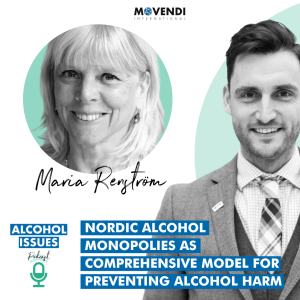
Monday Mar 03, 2025
Nordic Alcohol Monopolies As Comprehensive Model For Preventing Alcohol Harm
Monday Mar 03, 2025
Monday Mar 03, 2025
Nordic Alcohol Monopolies As Comprehensive Model For Preventing Alcohol Harm
With this episode of the Alcohol Issues Podcast we bring you a special discussion of a special alcohol policy topic: how the Nordic alcohol retail monopolies work and why they are so successful.
This is a special discussion because for the longest time, there was a gap between the public health success of the Nordic alcohol retail monopolies and public attention to that success.
But this is changing and with this episode we’re discussing a brand new report that compiles latest evidence about nordic alcohol monopolies as comprehensive model for preventing alcohol harm.
We bring you an inside view of the working and effects of the nordic alcohol retail monopolies together with an esteemed guest: Maria Renström.
We recorded this conversation on February 10, 2025.
Highlights of the show
In today’s show, Maria and host Maik Dünnbier discuss some highlights of her career and how this informs her current work in Sweden and for WHO. They dive deep into the new WHO Europe report "Nordic alcohol monopolies: understanding their role in a comprehensive alcohol policy structure and public health significance", why it is relevant now, what the report finds, and what its recommendations are.
Maria explains how the Nordic alcohol retail monopolies work, their key features, and how they are different from private, profit-driven models of alcohol retail. Maria and Maik also talk about the public support and look into the future.
Our guest
Maria Renström is one of the lead authors of WHO Europe’s new report on the Nordic alcohol monopolies.
In her illustrious career, with a background in socialogy, Maria has worked at all levels of government: city of Stockholm, ministry of health and social affiars in Sweden, European Commission, World Health Organization, where she has had different roles and responsibilities over the years.
She has been one of the decisive leaders for the adoption of the WHO Global Alcohol Strategy in 2010, the EU Alcohol Strategy in 2006, and the commitment for Sweden to maintain its alcohol retail monopoly when joining the EU 30 years ago.
Resources for the episode
- WHO/Europe highlights Nordic alcohol monopolies as a comprehensive model for alcohol harm prevention,
- Nordic alcohol monopolies: understanding their role in a comprehensive alcohol policy structure and public health significance (PDF),
- UN News: Nordic alcohol monopolies are reducing alcohol consumption, and
- Reducing alcohol consumption, the Nordic way: alcohol monopolies, marketing bans and higher taxation.
Feedback
Your feedback, questions, and suggestions for future topics and guests is most welcome. Please get in touch at: maik.duennbier@movendi.ngo.
You are most welcome to follow Movendi International and Maik Dünnbier on LinkedIn, too.
About The Alcohol Issues Podcast
The Alcohol Issues Podcast is an original production from Movendi International. It’s a show about latest alcohol policy developments, brand new research, and stories that reveal the predatory practices of the alcohol industry. We bring you in-depth conversations with trail-blazing alcohol policy makers, visionary community activists, and leading scientists. We do it all to reshape how the world thinks about alcohol’s impact on society and the benefits of alcohol policy action.
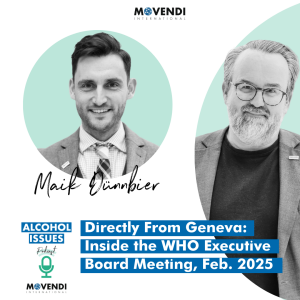
Thursday Feb 13, 2025
Directly From Geneva: Inside the WHO Executive Board Meeting
Thursday Feb 13, 2025
Thursday Feb 13, 2025
Directly From Geneva: Inside the WHO Executive Board Meeting
With this show, we bring you an inside view of the Executive Board meeting of the World Health Organization
Director of Strategy and Advocacy, Maik Dünnbier is in Geneva, representing Movendi International the membership to contribute to the discussions about key global health challenges.
In the show we want to share unique insights and brand new updates from the proceedings - directly from Geneva.
To do that, Maik changes his role and Pierre Andersson is the host of this episode. Pierre is Alcohol Policy Advocacy Advisor at Movendi International.
We recorded this conversation on February 11, 2025 – in the morning of the final day of the 156th session of the WHO Executive Board.
Highlights of the show
In today’s show, Pierre and Maik discuss what the WHO Executive Board is, why it matters, and why Movendi International is participating.
They dive deep into several topics that are on the agenda to discuss if and how alcohol harm and alcohol policy solutions are being addressed. Maik shares an analysis of gaps, omissions, and opportunities for improvement.
In the conversation, Pierre and Maik also shed light on alcohol industry interference and conflicts of interest.
And Pierre challenges Maik to look to the future, asking about what the deliberations and decisions at this Executive Board meeting mean for upcoming major event in global health later this year.
Our guest
Maik Dünnbier is Director of Strategy and Advocacy at Movendi International.
He has an academic background in political science, philosophy, and history of ideas as well as global development Dresden University, in Germany and Stockholm University, in Sweden.
In addition, he has extensive experience in youth work on local, national and European levels, having volunteered for more than a decade in different functions for Movendi International.
Maik leads Movendi International’s advocacy work on global and regional level, including the engagement with the UN system. Maik develops the strategic approach to advancing comprehensive alcohol policy solutions to support countries in achieving the Sustainable Development Goals.
You can follow Maik's work on LinkedIn.
Resources for the episode
- WHO EB 156, February 2025: Movendi International advocacy priorities and agenda item analysis
- All Movendi International statements
- WHO 156th Executive Board Meeting landing page
- All agenda items
Feedback
Your feedback, questions, and suggestions for future topics and guests is most welcome. Please get in touch at: maik.duennbier@movendi.ngo.
You are most welcome to follow Movendi International and Maik Dünnbier on LinkedIn, too.
About The Alcohol Issues Podcast
The Alcohol Issues Podcast is an original production from Movendi International. It’s a show about latest alcohol policy developments, brand new research, and stories that reveal the predatory practices of the alcohol industry. We bring you in-depth conversations with trail-blazing alcohol policy makers, visionary community activists, and leading scientists. We do it all to reshape how the world thinks about alcohol’s impact on society and the benefits of alcohol policy action.
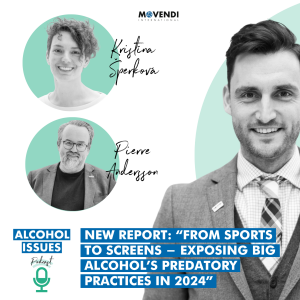
Friday Jan 31, 2025
Friday Jan 31, 2025
New Report: "From Sports to Screens - Exposing Big Alcohol’s Predatory Practices in 2024"
For the first episode in our fourth season we discuss a brand new report that reveals the unethical practices of the alcohol industry.
The report is called “From sports to screens: exposing Big Alcohol’s predatory practices in 2024”. Movendi International launched the report in a virtual event on January 16, 2025 and in today’s conversation I talk with the main author Pierre Andersson and the moderator of the launch event Kristína Šperková.
In this show, Pierre and Kristina share the most appalling cases of alcohol industry misconduct. They provide a unique analysis of how the alcohol industry is doing and what that means for our societies.
Host Maik Dünnbier unpacks the key findings of the brand new report with Kristína and Pierre. They discuss the lessons and insights from the launch event, where four experts from four different vantage points discussed alcohol industry interference and what to do about it.
- Vesna Kerstin Petric, Head of the Office for Cooperation with WHO at the Ministry of Health of Slovenia, and member of the WHO Executive Board
- Monika Kosinska, Global Head of Economic and Commercial Determinants, World Health Organization
- Jim McCambridge, University College London, UK
- Juliet Namukasa, Chairperson, Uganda Alcohol Policy Alliance
Together they talk about the Dubious Five strategies and the key themes of alcohol industry interference in 2024, and they discuss what it all means for 2025.
Our guests
Pierre Andersson is Alcohol Policy Advocacy Advisor at Movendi International.
As part of this work, he’s monitoring, documenting, and exposing the strategies and tactics of the alcohol industry on a daily basis. For example, in 2024, he published more than 100 cases of misconduct on the BigAlcohol.Exposed website.
You can follow Pierre's work on LinkedIn.
Kristína Šperková is International President of Movendi International.
As part of this work, she faces alcohol industry interference at all levels, be it in local communities in Slovakia or at the international level in the areas of global health and sustainable development. Kristina has worked for 20 years to address alcohol as a women’s rights issue and has documented how the alcohol industry has exploited women to market and sell alcohol to men, and later began to target women to drive up alcohol use in women. All these Big Alcohol practices have severe consequences for the health and rights of women.
You can follow Kristína's work on LinkedIn.
Feedback
Your feedback, questions, and suggestions for future topics and guests is most welcome. Please get in touch at: maik.duennbier@movendi.ngo.
You are most welcome to follow Movendi International and Maik Dünnbier on LinkedIn, too.
About The Alcohol Issues Podcast
The Alcohol Issues Podcast is an original production from Movendi International. It’s a show about latest alcohol policy developments, brand new research, and stories that reveal the predatory practices of the alcohol industry. We bring you in-depth conversations with trail-blazing alcohol policy makers, visionary community activists, and leading scientists. We do it all to reshape how the world thinks about alcohol’s impact on society and the benefits of alcohol policy action.
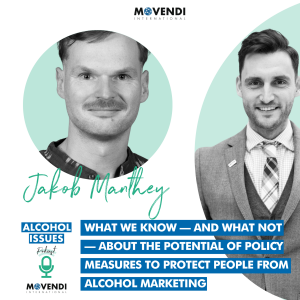
Thursday Jan 30, 2025
Thursday Jan 30, 2025
What We Know For Sure – and What Not – About the Potential of Policy Measures to Protect People From Alcohol Marketing
For the eleventh episode in our third season we discuss what we know for sure – and what not – about the potential of policy measures to protect people from alcohol marketing.
Together with today’s guest, Dr Jakob Manthey, we discuss his recent and hotly debated study that found that alcohol marketing bans do not constitute a best buy for reducing alcohol consumption.
In this show, host Maik Dünnbier and Jakob Manthey discuss in depth the study published in January 2024 where Jakob and colleagues systematically reviewed the evidence for effects of total and partial bans of alcohol marketing on alcohol consumption. This study got a lot of attention because of the conclusion that “there is insufficient evidence to claim that alcohol marketing bans are a best buy to reduce alcohol consumption.” Maik and Jakob talk about why this systematic review was necessary, what the findings are, and what the results mean and do not mean.
Maik also asks a few critical questions about the study and Jakob shared valuable insights.
They also talk about the meaning of the study results and where we go from here – in research, policy, and advocacy.
Background to the show and study
Alcohol marketing is a billion dollar business and alcohol companies pumping so much money into advertising, promotion, and sponsorship means they are getting massive returns on their investments.
Six alcohol companies rank among the world’s largest spenders on advertising. The leading alcohol advertisers worldwide spent an estimated US$ 17.2 billion on alcohol advertising in 2019. In both high- and low-income countries, alcohol marketers occupy dominant positions, and in 24 of the countries tracked by AdAge, they are among the 10 largest advertising spenders.
And evidence shows that alcohol marketing makes children and youth initiate alcohol use earlier and if they already consume alcohol, exposure to alcohol marketing makes them consume even more alcohol.
A 2021 study revealed that the alcohol industry made $17.5 billion in sales revenue (in 2016) from alcohol sales to minors in the United States.
The World Health Organization has classified banning alcohol ads, promotion, and sponsorship as one of three alcohol policy best buy solutions to prevent and redcuce alcohol harm.
But a recent and hotly debated study systematically reviewed the evidence for effects of total and partial bans of alcohol marketing on alcohol consumption. Jakob and his research colleagues concluded that available empirical evidence does not support the claim that alcohol marketing bans constitute a best buy for reducing alcohol consumption.
For this podcast conversation we have invited the lead author Dr Jakob Manthey.
Our guest
Dr Jakob Manthey is a renowned researcher in the field of alcohol epidemoelogy and policy.
He has published groundbreaking studies in those areas. Dr Manthey is the Head of Working Group "Public health and substance use" at the Centre for Inter-Disciplinary Addiction Research at the University of Hamburg in Germany.
You can follow Jakob's work here and on Research Gate.
Resources for the episode
- Review: "Restricting alcohol marketing to reduce alcohol consumption: A systematic review of the empirical evidence for one of the ‘best buys’"
- Commentary by Critchlow on Manthey et al.: "No more missed opportunities—We need to address the absence of robust and comprehensive evaluations about the real-world impact of statutory restrictions on alcohol marketing"
- Casswell's letter to the editor: "Misleading conclusion from limited research approach: Comment on Manthey et al. ‘Restricting alcohol marketing to reduce alcohol consumption: A systematic review of the empirical evidence for one of the 'best buys'"
- Letter to the editor by Manthey and colleagues, in response to Casswell: "Rescheduling alcohol marketing bans within the World Health Organization menu of policy options"
- Casswell's commentary: "Normative value of ‘best buys’ and the case of bans on alcohol marketing"
- Blog post: "Three Ways Alcohol Marketing Causes Harm and One Effective Solution"
Feedback
Your feedback, questions, and suggestions for future topics and guests is most welcome. Please get in touch at: maik.duennbier@movendi.ngo.
You are most welcome to follow Movendi International and Maik Dünnbier on LinkedIn, too.
About The Alcohol Issues Podcast
The Alcohol Issues Podcast is an original production from Movendi International. It’s a show about latest alcohol policy developments, brand new research, and stories that reveal the predatory practices of the alcohol industry. We bring you in-depth conversations with trail-blazing alcohol policy makers, visionary community activists, and leading scientists. We do it all to reshape how the world thinks about alcohol’s impact on society and the benefits of alcohol policy action.
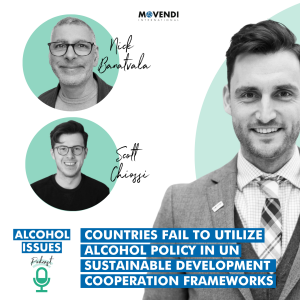
Wednesday Jan 29, 2025
Wednesday Jan 29, 2025
Countries Fail To Utilize Alcohol Policy In United Nations Sustainable Development Cooperation Frameworks
For the tenth episode in our third season we discuss how countries are using the potential of alcohol policy to achieve the sustainable development goals - based on a landmark report from the UN Interagency Task Force on NCDs.
Together with Scott Chiossi and Nick Banatvala we’re telling a story that will change how you view the role and potential of alcohol policy for promoting development.
In today’s show, host Maik Dünnbier speaks with Scott and Nick about their landmark report that describes if and how alcohol has been integrated into United Nations Sustainable Development Cooperation Frameworks (UNSDCFs) as a risk factor for developing NCDs and/or as a link to mental health and behavioural conditions.
They analyzed 135 countries that rolled out a UNSDCF recently to see if and how alcohol policy is being addressed. In their conversation they discuss the findings of their analysis and why this analysis was needed in the first place?
Together, they make sense of the findings. The results of the study are underwhelming but Nick and Scott help to understand the reasons why - charting a constructive way forward.
They explore a key analysis of how different policy areas and dimensions of sustainable develpoment benefit from alcohol policy action. And Nick talks about multiple paths forward that the Task Torce, WHO and other UN agencies, civil society, and countries can take.
Our guests
Nick is the head of the Secretariat of the UN Interagency Task Force on NCDs.
Nick was Head of Global Affairs at the Department of Health in England where he led the development and implementation of the UK Government's first-ever global health strategy.
Nick has vast experience from his work in the UK government, at the Centers for Disease Control and Prevention in the US, and at universities.
In addition to being the lead author of a number of WHO and UK government publications, Nick has published widely in a range of peer-reviewed journals. Nick is co-editor of Noncommunciable Diseases: A Compendium, published in 2023.
You can follow Nick's work on LinkedIn.
Scott is a Technical Officer working as part of the Task Force Secretariat.
He coordinates and supports a number of the Task Force’s working groups, and works on the Joint Programme on Catalyzing country action for NCDs and mental health.
You can follow Scott's work on LinkedIn.
Resources for the episode
- Book: "Noncommunicable Diseases A Compendium," Edited By Nick Banatvala, Pascal Bovet
- UNIATF Report: "Countries Fail to Utilize Alcohol Policy in United Nations Sustainable Development Cooperation Frameworks"
- UNIATF Report 2024: "New Report Shows Raising Pro-Health Taxes Could Save 50 Million Lives Over Next 50 Years"
- UNIATF News update: "Discussions at UNGA highlight alcohol is not being addressed in UN Cooperation Frameworks"
- Report 2020: "WHO NCDs Progress Monitor 2020"
- News report: "World Health Assembly Adopts More Best Buys to Tackle NCDs, Reconfirms Impact of Alcohol Policy Best Buys"
- Scientific study: "The Burden of Non-communicable Diseases Among Adolescents Aged 10–24 Years in the EU, 1990–2019"
Feedback
Your feedback, questions, and suggestions for future topics and guests is most welcome. Please get in touch at maik.duennbier@movendi.ngo.
You are most welcome to follow Movendi International and Maik Dünnbier on LinkedIn, too.
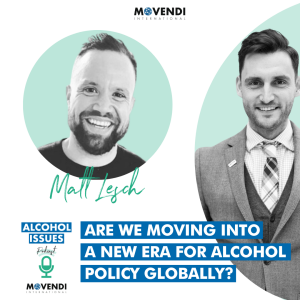
Saturday Dec 21, 2024
Are We Moving Into a New Era For Alcohol Policy Globally?
Saturday Dec 21, 2024
Saturday Dec 21, 2024
Are We Moving Into a New Era For Alcohol Policy Globally?
Season 3, Episode 10
For the tenth episode in our third season we discuss the question of whether we’re moving into a new era for alcohol policy globally.
Together with Dr Matt Lesch we’re telling a story that change how you view the challenges, opportunities and progress in global alcohol policy.
In this podcast episode, host Maik Dünnbier speaks with Matt about two of his studies that investigate the state and development of global alcohol policy over the past 14 years – from the adoption of the WHO Global Alcohol Strategy in 2010 to the adoption of the WHO Global Alcohol Action Plan in 2022.
They talk about why both policy documents matter and what their significance is. Matt compares the Global Alcohol Strategy and the Global Alcohol Action Plan and this analysis allows to identify key themes and to assess whether the Action Plan is an advancement for global alcohol policy.
The conversation takes place at the intersection of global health, political science, and real world policy making. And Maik and Matt dive into topics that are relevant for policy makers and alcohol policy advocates alike.
Together they talk about how the alcohol industry, their fundamental conflict of interest and their interference against WHO-recommended alcohol policy is being tackled and whether this marks a step in the right direction of protecting public policy making from corporate interests.
And they explore the pros and cons of whether these developments pave the way towards a new era for global alcohol policy.
Our guest
Dr Matt Lesch is a lecturer at the University of York, in the UK.
Matt’s expertise lies in the politics of policymaking. He has an interdisciplinary research agenda situated at the intersection of comparative public policy, political science, and public health.
His main research interests include ideas and policy change, processes of policy transfer, and the politics of evidence-policy making. His research has explored these issues in several different domains, including alcohol policy, public health, and taxation.
Follow Matt’s work on LinkedIn.
Resources for the episode
- Study from February 2024: “Are we moving into a new era for alcohol policy globally? An analysis of the Global Alcohol Action Plan 2022-30”
- Study from June 2024: “Continuities and change in alcohol policy at the global level: a documentary analysis of the 2010 Global Strategy for Reducing the Harmful Use of Alcohol and the Global Alcohol Action Plan 2022–2030”
- The WHO Global Alcohol Strategy from 2010 (PDF)
- Movendi International resource page about the WHO Global Alcohol Strategy
- The WHO Global Alcohol Action Plan from 2022 (PDF)
- Movendi International resource page about the WHO Global Alcohol Action Plan
- Report: Big Alcohol Attempts to Undermine WHO Global Action Plan
- News story from May 2022: “World Health Assembly Adopts Historic Global Alcohol Action Plan. Movendi International Makes Four Recommendations For the Way Forward”
- The Alcohol Issues Podcast episode with Prof. Amandine Garde: “A Human Rights Based Approach to Alcohol Policy: the WHO Global Alcohol Action Plan and Beyond”
Feedback
Your feedback, questions, and suggestions for future topics and guests is most welcome. Please get in touch at maik.duennbier@movendi.ngo.
You are most welcome to follow Movendi International and Maik Dünnbier on LinkedIn, too.
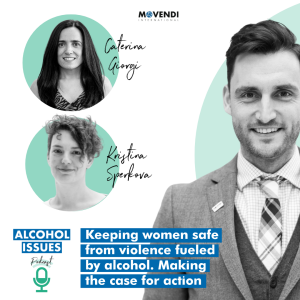
Thursday Dec 05, 2024
Keeping women safe from violence fuelled by alcohol. Making the case for action
Thursday Dec 05, 2024
Thursday Dec 05, 2024
Keeping Women Safe From Violence Fueled By Alcohol – Making the Case for Action
Season 3, Episode 9
For the ninth episode in our third season we explore the role alcohol plays in fueling violence against women.
Together with Caterina Giorgi and Kristina Sperkova we’re telling the story of how we can keep women safe from violence fueled by alcohol. We learn from advocacy success and real progress in Australia and make the case for action.
In this episode, host Maik Dünnbier speaks with Caterina and Kristina about their experiences of advocating for alcohol policy to be part of the solutions to the crisis of gender-based violence. They dive into the Australian story and learn about the advocacy success and we discuss the global picture of alcohol’s role in men’s violence against women and why there’s little progress in problem recognition and policy development. They explore the factors of success in Australia and talk about other countries where similar coalitions are achieving progress.
They also talk about the commercial drivers of men’s violence against women, the importance of partnerships and of women with lived experience driving the conversation and they discuss the responsibility of governments to take action.
Our guests
Caterina is the CEO of FARE, the Foundation for Alcohol Research and Education.
FARE is a not-for-profit organisation with a vision for an Australia free from alcohol harms – where communities are healthy and well, and where laws, policies and programs are fair, equitable and just. In her role as CEO of FARE, Caterina is partnering with affected communities and women with lived experience, survivng men’s violence fueled by alcohol. Together they’ve mounted an impactful advocacy initiative to make alcohol policy a priority in the national response to the crisis of violence against women.
Follow Caterina’s work on LinkedIn.
Kristina is the International President of Movendi International.
Movendi International is the largest global social movement working to protect people from the harms caused by alcohol companies and to achieve development for all through advancing alcohol policy solutions so that everyone can live up to their fullest potential. In her role as President of Movendi, Kristina has been leading the work to address alcohol harm as a feminist issue, exposing how the alcohol industry foments stereotypes, norms, and behaviors that dehumanize, objectify and sexualize women and fuel gender-based violence.
Follow Kristina’s work on LinkedIn.
Resources for the episode
FARE has a dedicated page about action on alcohol and gendered violence.
FARE’s advocacy campaign timeline is very informative and inspiring.
The Prevention Collective – a global network of practitioners, activists, and researchers working to end gendered violence worldwide – released a comprehensive evidence review on the potential of addressing alcohol to prevent and reduce gendered violence.
Movendi International resources on alcohol’s role in gendered violence:
- 300+ resources article on issues regarding alcohol violence.
- 18 blog posts by Kristina Sperkova with a feminist lens on alcohol harm and policy actions, with a focus on alcohol policy action to prevent and reduce men’s violence against women.
- 50+ science digest articles summarizing latest science on alcohol and violence against women and the prevention potential of alcohol policy.
- World class research report: Alcohol and violence – part of the research report series “Alcohol and Society”.
Feedback
Your feedback, questions, and suggestions for future topics and guests is most welcome. Please get in touch at: maik.duennbier@movendi.ngo.
You are most welcome to follow Movendi International and Maik Dünnbier on LinkedIn, too.
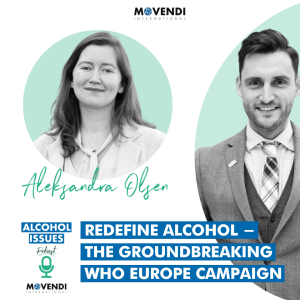
Wednesday Oct 30, 2024
Redefine Alcohol - the Groundbreaking WHO Europe Campaign
Wednesday Oct 30, 2024
Wednesday Oct 30, 2024
Redefine Alcohol - the Groundbreaking WHO Europe Campaign
Season 3, Episode 7
In this episode, we explore Redefine Alcohol - a groundbreaking new campaign launched by the World Health Organization in Europe. Together with Aleksandra Olsen of WHO Europe we’re telling a story that might change how you think about the role of alcohol in society. Stay tuned!
About the guest: Aleksandra Olsen is Communication Officer at WHO Europe. She is currently supporting the WHO-EU Evidence into Action Alcohol Project. In this role, Aleksandra works with communication planning and strategy, communications activities, social media, PR and media relations.

